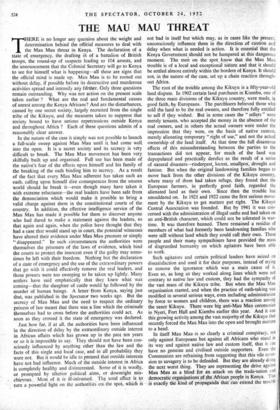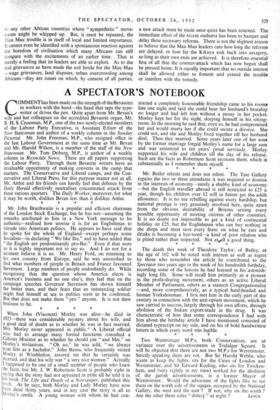THE MAU MAU THREAT
is no longer any question about the weight and determination behind the offiNal measures to deal with the Mau Mau threat in Kenya. The declaration of a state of emergency, the drafting ih of a battalion of British troops, the round-up of suspects leading to 104 arrests, and the 'announcement that the Colonial Secretary will go to Kenya to see for himself what is happening—all these are signs that the official mind is made up. Mau Mau is to be rooted out without delay, if possible before its destructive and murderous activities spread and intensify any nether. Only three questions remain outstanding. Why was not action on the present scale taken earlier ? What are the real and fundamental causes of unrest among the Kenya Africans? And are the disturbances, caused by one secret society, largely recruited from the single tribe of the Kikuyu, and the measures taken to suppress that society bound to have serious repercussicns outside Kenya and throughout Africa ? Each of these questions admits of a reasonably clear answer.
In the nature of the case it simply was not possible to launch a full-scale sweep against Mau Mau until it had come well into the open. It is a secret society and its secrecy is very difficult to break. The Mau Mau movement has been very skilfully built up and organised. Full use has been made of the native's fear of the effects, upon himself and his family of the breaking of the oath binding him to secrecy. As a result of the fact that every Mau Mau adherent has taken such an oath, calling upon himself dire consequences from the unseen world should he break it—even though many have taken it with extreme reluctance—the real leaders have been safe from the denunciation which would make it possible to bring a valid charge against them in the constitutional courts of the country. In addition, the effective intelligence service of the Mau Mau has made it possible for them to discover anyone who had dared to make a statement against the leaders, so that again and again, when the police have thought that they had a case that would stand up in court, the potential witnesses have altered their evidence under Mau Mau pressure or simply " disappeared." In• such circumstances the authorities were themselves the prisoners of the laws of evidence, which bind the courts to protect the innocent even if the guilty may some- times be left with their freedom. Nothing but the declaration of a state of emergency and the use of the extraordinary powers that go with it could effectively remove the real leaders, and those powers were too sweeping to be taken up lightly. Many settlers have said emphatically that they knew what was coniing—that the slaughter of cattle would by followed by the murder of human beings. A letter from Kenya, saying just that, was published in the Spectator two weeks ago. But the secrecy of Mau Mau and the need to respect the ordinary process of law meant that there was a line which the criminals themselves had to cross before the authorities could act. As soon as they crossed it the state of emergency was declared.
Just how far, if at all, the authorities have been influenced in the direction of delay by the extraordinary outside interest in African affairs which has grown up in the past ten years or so it is impossible to say. They should not have been con- sciously influenced by anything other than the law and the facts of this single and local case, and id all probability they were not. But it would be idle to pretend that' outside interests have not had influence. Much of the outside interest in Africa is completely healthy and disinterested. Some of it is woolly, or prompted by ulterior political aims, or downright mis- chievous, Most of it is ill-infouned. The total effect is to turn a powerful light on the authorities on- the spot, which is not bad in itself but which may, as in cases like the present, unconsciously influence them in the direction .of caution and delay when what is needed is action. It is essential 'that the Kenya Government should not be hampered at this dangerous moment. The men on the spot know that the Mau Mau trouble is of a local and exceptional nature and that it should be settled almost entirely within the borders of Kenya. It should not, in the nature of the case, set up a chain reaction through- out ),,frica.
The root of the trouble among the Kikuyu is a fifty-year-old land dispute. In 1902 certain land purchases in Kiambu, one of the three main divisions of the Kikuyu country, were made, io good faith, by Europeans. The purchfisers believed those who sold the land to be the real owners, and therefore fully entitled to sell if they wished. But in some cases the " sellers " were merely tenants, who accepted /he money in the absence of the real owners, and in others the actual owners were under the impression that they were, on the basis of native custom, merely alienating temporary " right of use," and not the actual ownership of the land itself. At that time the full disastrous effects of this misunderstanding between the parties to the transactions did not appear, for much of the land was depopulated and practically derelict as the result of a series of natural disasters—rinderpest, locust, smallpox, drought and famine. But when the original' landowning families began to move back from the other divisions of the Kikuyu country, where many of them had taken refuge, they found that the European farmers, in perfectly good faith, regarded the alienated land as their own. Since then the trouble has smouldered on. In 1921 and 1922 came the first serious-move- ment by the Kikuyu to get matters put right. The Kikuyu Central Association was founded. But by 1941 it was con- cerned with the administration of illegal oaths and had taken on an anti-British character, which could not be tolerated in war- time. It was -therefore banned. There remained a residue of members of what had formerly been landowning families who were still without land which they could call their own. These people and their many sympathisers have provided the mass of disgruntled humanity on which agitators have been able to work.
Such agitators and certain political leaders have seized on dissatisfaction and used it for their purposes, instead of trying to remove the ignorance-.which was a main cause of it. Even so, as long as they worked along lines which were not contrary to native law 'and custom, they had the sympathy of the vast mass of the Kikuyu tribe. But when the Mau Mau organisation started,. and when the practice of oath-taking was modified in several serious ways, even including administration by force to women and children, -there was a reaction among the saner 'Kikuyu. There were big anti-Mau Mau ceremonies in Nyeri, Fort Hall and Kiambu earlier this year. And it was this growing activity among the vast majority of the Kikuyu that recently forced the Mau Mau into the open and brought matters to a head.
In itself Mau Mau .is so clearly a criminal conspiracy, not only against Europeans but against all Africans who stand in its way and against native law and custom itself, that it can have no genuine and civilised outside supporters. Even the Communists are refraining from suggesting that this vile rever- sion to savagery is to be defended. But they are already doing the next worst thing. They are representing the drive aga inst Mau Mau as a blind for an attack on the trade-union and democratic organisations of the African people in Kenya. This is exactly the kind of propaganda that' can extend the troubld to any other African countries where " sympathetic " move- ments might be whipped up. But, it must be repeated, the Mau Mau trouble is in itself of local and limited importance. It cannot even be identified with a spontaneous reaction against the boredom of civilisation which many Africans can still compare with the excitements of an earlier time. That is merely a feeling that its leaders are able to exploit. As to the real grievances as have made the soil fertile for the Mau Mau —wage grievances, land disputes, urban overcrowding among Africans—they are issues on which, by consent of all parties, a new attack must be made once quiet has been restored. The immediate effect of the recent outburst has been to hamper and delay these necessary reforms. There is not the slightest reason to believe that the Mau Mau leaders care how long the reforms are delayed, or how far the Kikuyu sink back into savagery, so long as their own ends are achieved. It is therefore essential first of all that the counter-attack which has now begun shall be pressed home. It is equally important that no outside interest shall be allowed either to foment and extend the trouble or interfere with the remedy.



































 Previous page
Previous page